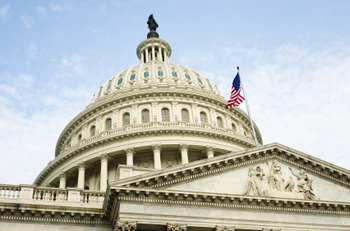
RegBlog reviews regulatory reform bills pending in various stages before the Senate.
As part of our new series on Regulatory Reform in the 112th Congress, today we focus on bills introduced in the Senate.
Unless noted otherwise, we use the term “significant regulation” throughout our review to refer to any rule that would have an anticipated effect on the economy of at least $100 million annually, that would interfere with other agency actions, or that raises a novel legal or policy issue. Also, unless noted otherwise, each bill is currently still in committee.
1530 – Closing Regulatory Loopholes Act
Introduced by Sen. Mike Johanns (R – NE)
As the name suggests, Senator Johanns’ bill seeks to close a perceived loophole in the regulatory process by imposing the same procedural requirements for guidance documents that are currently in place for rules. A guidance document is defined as “an agency statement of general applicability and future effect, other than a regulatory action, that sets forth a policy on a statutory, regulatory or technical issue or an interpretation of a statutory or regulatory issue.” The bill would insert the words “or guidance document” and “or major guidance document” in the sections of the U.S. Code that define procedural requirements for rule promulgation.
1531 – Two Year Regulatory Freeze Act
Introduced by Sen. Mike Johanns (R – NE)
Senator Johanns’ second regulatory reform bill—which is less than a page and a half long—prohibits agencies from promulgating rules or finalizing draft rules until January 31, 2013. The bill does not apply to rules covered by 5 U.S.C. § 553(a), which exempts regulations pertaining to military or foreign affairs or involving “a matter relating to agency management or personnel or to public property, loans, grants, benefits, or contracts.”
1538 – Regulatory Time-Out Act
Introduced by Susan Collins (R – ME)
The Senate Regulatory Time-Out Act has essentially the same provisions as Rep. Richard Hanna’s (R – NY) bill of the same name (H.R. 3257), and would prohibit promulgation of new rules and treat enacted rules as if they had not gone into effect for a one-year period beginning on the date the bill would go into effect. The bill includes exceptions for regulations deemed necessary for internal revenue laws, criminal laws, human health or safety, military or foreign affairs, and job creation.
1720 – Jobs Through Growth Act
Introduced by John McCain (R – AZ)
Senator McCain’s bill, one of the longest reviewed by The Regulatory Review this week, is a comprehensive regulatory reform bill that would reform regulation across many domains. First, it would repeal both the Affordable Care Act and the Dodd-Frank Act, restoring the statutes amended by those act to their pre-amendment versions. The bill subsumes several other regulatory reform bills, including the REINS Act and the Regulatory Moratorium and Jobs Preservation Act. In addition to prohibiting a final rulemaking if an agency finds the rule’s quantified benefits to be less than the quantified costs, the bill grants judicial review standing for individuals adversely affected by a regulation. It also expresses the sense of Congress that Senate Joint Resolution 10, the balanced budget amendment bill, “should be passed and submitted to the states for ratification.” Senator McCain’s bill has moved out of committee and been placed on the Senate calendar.



